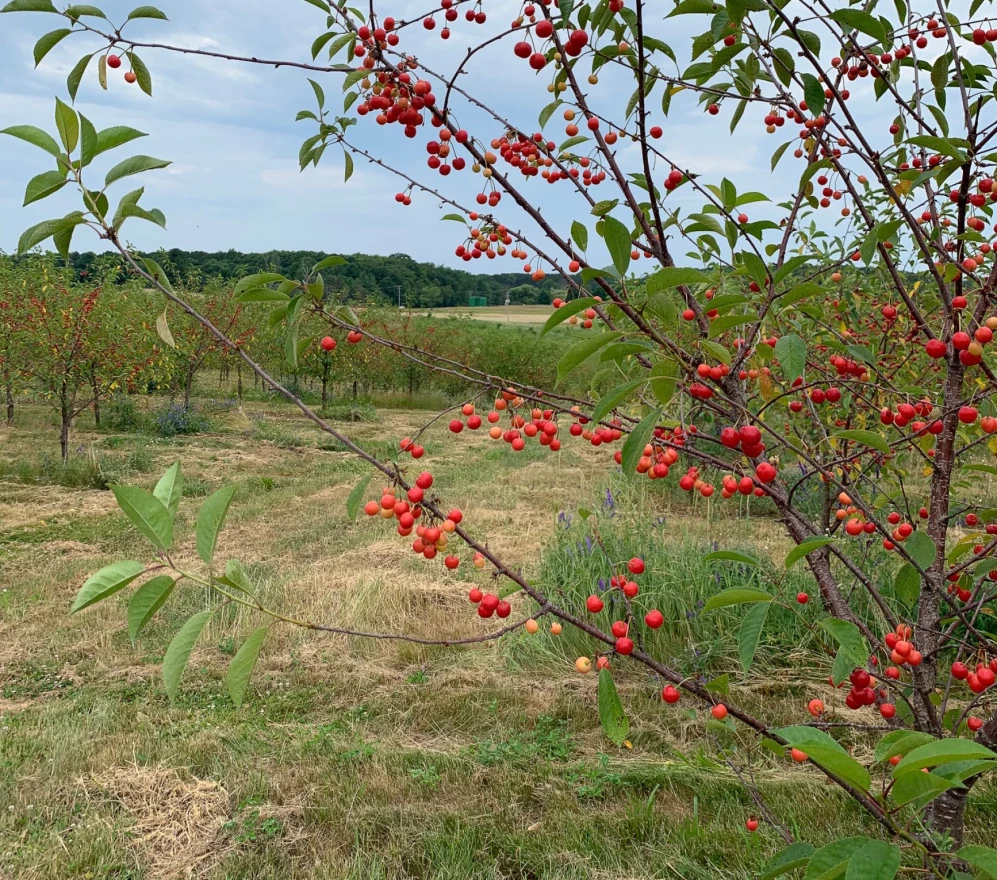The National Cherry Festival wraps up this weekend in Traverse City, but the cherry harvest has just begun.
Nikki Rothwell, who studies fruit for the Northwest Michigan Horticulture Research Center, says to expect some extra flavorful cherries this year.
"The notable thing is, we haven't had any rain... So I would say quality of fruit is fabulous — really high sugar content because there's been no water to dilute the sugar in the fruit. I mean, cherries are a total joy to eat this year," Rothwell said. "Lack of rain can affect fruit size, so fruit may be smaller, but some of our sweet cherries that we're harvesting are big and beautiful."
The drought this year has also minimized disease — fungal pathogens thrive in warmer, wetter conditions.
But the harvest is lighter than usual this year, Rothwell says, especially for tart cherries. Warm weather in the spring, followed by a cold snap, could be to blame.
"This year, our crop size is estimated to be about 55 million pounds in northwest Michigan. In the old days, it was somewhere like 180 million pounds. So we're probably a third of the crop this year," Rothwell said. "That could change once we know the carrying capacity of how much fruit we could actually, or are, growing in the region."
ROLLING THE DICE
Cheryl Kobernik and her family have grown cherries at North Star Organics in Frankfort for nearly 40 years. She says the unpredictability of each season is nothing new.
"It's just like going to the casino and pulling the lever and going, 'Okay, what's it going to be?'"
But in recent years, she says, more extreme variability has made it harder to count on a reliable harvest.
"I can tell you just in the 38 years that we've been here, this is not normal growing weather like we had for the first 25 years," said Kobernik.
In 2021, late frosts decimated North Star's entire crop, including U-pick cherries, which many growers rely on as a steady, profitable source of revenue. And in the years before those late frosts, the harvests were complicated by the pandemic and a bad infestation of spotted wing drosophila, a type of fruit fly.
But there are more than just unpredictable natural factors at play.
Kobernik says skyrocketing land costs and tough pricing from industry buyers make cherry growing in northern Michigan less and less viable.
"You need to make a living off this. You need to be able to take a vacation. You need to be able to have your kids go to college," she said.
To afford those things, she and her husband have shouldered other careers on top of farming.
"My day job pays for my perennial garden. My day job pays for my car," Kobernik said. "The farm should be able to give people a decent living."
But right now that's not easily done. Kobernik hopes future farmers are able to make it by diversifying their crops on less acreage and focusing more on U-pick operations.
NEW APPROACHES
Rothwell has seen other creative solutions.
"We've seen some growers sell off a piece of their property to pay off some debt and do more retail," she said. "We've seen growers add wine tasting to their farm market operation, or add a commercial kitchen where they can offer baked goods."
Regardless of how farmers adapt, Rothwell says, the cherry growing of yesteryear won't be able to cut it for much longer — extreme weather events, more widespread pathogens, and the cost of land make it so that farmers will need to shift away from focusing only on cherries.
But both Rothwell and Kobernik are hopeful that cherry growing is here to stay in Michigan, at least in some capacity.
Rothwell says the nurseries who breed and graft cherry saplings are working hard to select for trees that are more tolerant to extreme weather conditions.
Kobernik says the rolling hills, sandy soils, and wind from the lake that make northern Michigan so good for growing cherries are all here to stay — and farmers are committed to the iconic fruit, even as growing it starts to look a little different than it used to.


